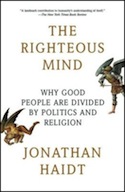
Americans have always be divided by race and background, but today we’re just as likely to be divided by our politics. Evolution, according to social psychologist Jonathan Haidt, has wired us to divide ourselves into hostile groups—and to be less inclined to want to work through our disagreements with others. Haidt, winner of the Third Annual Zócalo Book Prize, visits Zócalo to talk about whether Americans can learn to reconcile politics and reason. Below is an excerpt from his book, The Righteous Mind: Why Good People are Divided By Politics and Religion.
 “Can we all get along?” That appeal was made famous on May 1, 1992, by Rodney King, a black man who had been beaten nearly to death by four Los Angeles police officers a year earlier. The entire nation had seen a videotape of the beating, so when a jury failed to convict the officers, their acquittal triggered widespread outrage and six days of rioting in Los Angeles. Fifty-three people were killed and more than 7,000 buildings were torched. Much of the mayhem was carried live; news cameras tracked the action from helicopters circling overhead. After a particularly horrific act of violence against a white truck driver, King was moved to make his appeal for peace.
“Can we all get along?” That appeal was made famous on May 1, 1992, by Rodney King, a black man who had been beaten nearly to death by four Los Angeles police officers a year earlier. The entire nation had seen a videotape of the beating, so when a jury failed to convict the officers, their acquittal triggered widespread outrage and six days of rioting in Los Angeles. Fifty-three people were killed and more than 7,000 buildings were torched. Much of the mayhem was carried live; news cameras tracked the action from helicopters circling overhead. After a particularly horrific act of violence against a white truck driver, King was moved to make his appeal for peace.
King’s appeal is now so overused that it has become cultural kitsch, a catchphrase more often said for laughs than as a serious plea for mutual understanding. I therefore hesitated to use King’s words as the opening line of this book, but I decided to go ahead, for two reasons. The first is because most Americans nowadays are asking King’s question not about race relations but about political relations and the collapse of cooperation across party lines. Many Americans feel as though the nightly news from Washington is being sent to us from helicopters circling over the city, delivering dispatches from the war zone.
The second reason I decided to open this book with an overused phrase is because King followed it up with something lovely, something rarely quoted. As he stumbled through his television interview, fighting back tears and often repeating himself, he found these words: “Please, we can get along here. We all can get along. I mean, we’re all stuck here for a while. Let’s try to work it out.”
This book is about why it’s so hard for us to get along. We are indeed all stuck here for a while, so let’s at least do what we can to understand why we are so easily divided into hostile groups, each one certain of its righteousness.
*
I could have titled this book The Moral Mind to convey the sense that the human mind is designed to “do” morality, just as it’s designed to do language, sexuality, music, and many other things described in popular books reporting the latest scientific findings. But I chose the title The Righteous Mind to convey the sense that human nature is not just intrinsically moral, it’s also intrinsically moralistic, critical, and judgmental.
The word righteous comes from the old Norse word rettviss and the old English word rihtwis, both of which mean “just, upright, virtuous.” This meaning has been carried into the modern English words righteous and righteousness, although nowadays those words have strong religious connotations because they are usually used to translate the Hebrew word tzedek. Tzedek is a common word in the Hebrew Bible, often used to describe people who act in accordance with God’s wishes, but it is also an attribute of God and of God’s judgment of people (which is often harsh but always thought to be just).
The linkage of righteousness and judgmentalism is captured in some modern definitions of righteous, such as “arising from an outraged sense of justice, morality, or fair play.” The link also appears in the term self-righteous, which means “convinced of one’s own righteousness, especially in contrast with the actions and beliefs of others; narrowly moralistic and intolerant.” I want to show you that an obsession with righteousness (leading inevitably to self-righteousness) is the normal human condition. It is a feature of our evolutionary design, not a bug or error that crept into minds that would otherwise be objective and rational.
Our righteous minds made it possible for human beings—but no other animals—to produce large cooperative groups, tribes, and nations without the glue of kinship. But at the same time, our righteous minds guarantee that our cooperative groups will always be cursed by moralistic strife. Some degree of conflict among groups may even be necessary for the health and development of any society. When I was a teenager I wished for world peace, but now I yearn for a world in which competing ideologies are kept in balance, systems of accountability keep us all from getting away with too much, and fewer people believe that righteous ends justify violent means. Not a very romantic wish, but one that we might actually achieve.




Send A Letter To the Editors